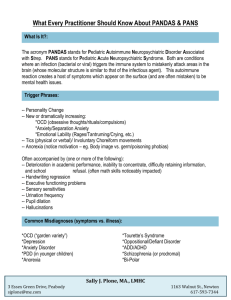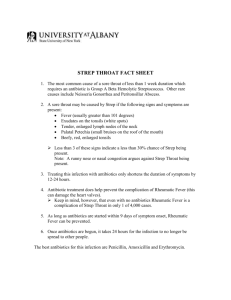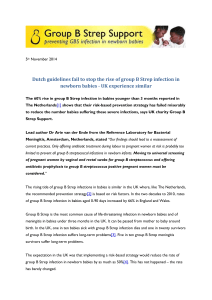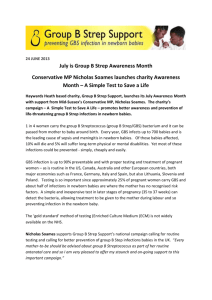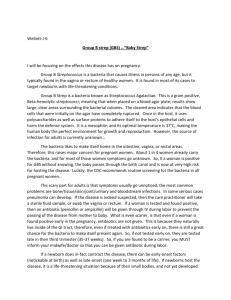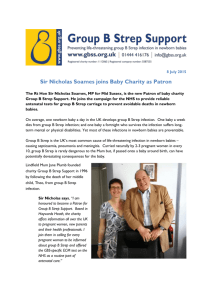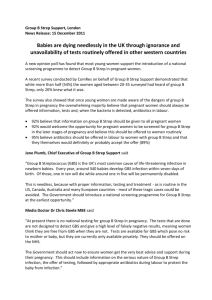Leading baby health charity fears the Government is hiding a public
advertisement
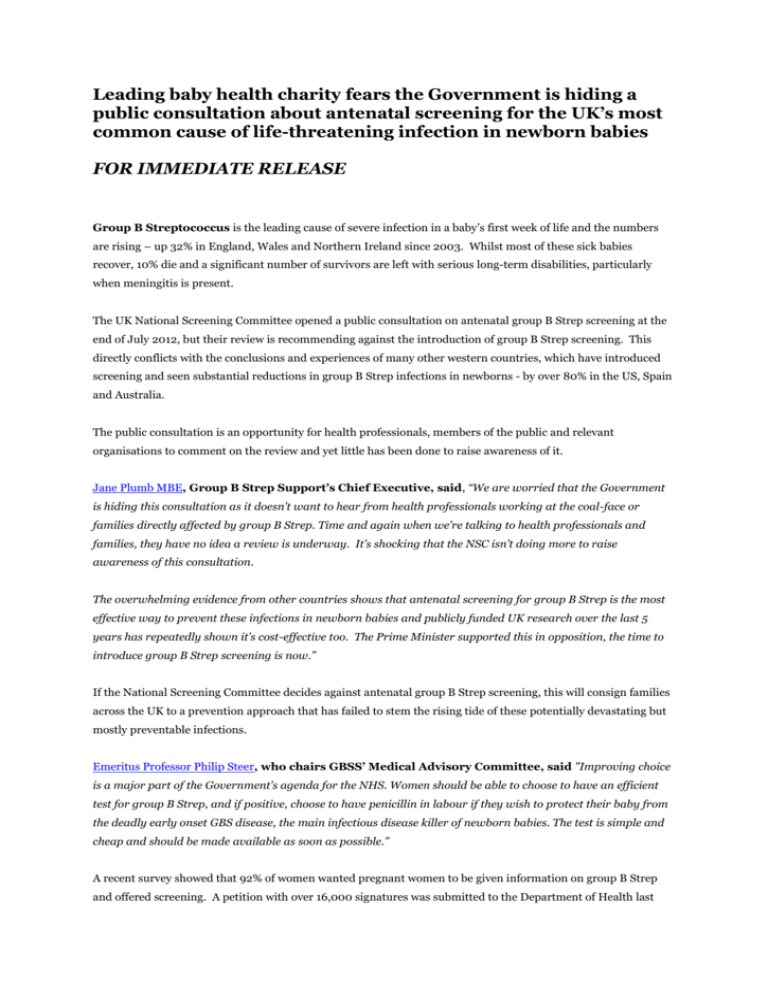
Leading baby health charity fears the Government is hiding a public consultation about antenatal screening for the UK’s most common cause of life-threatening infection in newborn babies FOR IMMEDIATE RELEASE Group B Streptococcus is the leading cause of severe infection in a baby’s first week of life and the numbers are rising – up 32% in England, Wales and Northern Ireland since 2003. Whilst most of these sick babies recover, 10% die and a significant number of survivors are left with serious long-term disabilities, particularly when meningitis is present. The UK National Screening Committee opened a public consultation on antenatal group B Strep screening at the end of July 2012, but their review is recommending against the introduction of group B Strep screening. This directly conflicts with the conclusions and experiences of many other western countries, which have introduced screening and seen substantial reductions in group B Strep infections in newborns - by over 80% in the US, Spain and Australia. The public consultation is an opportunity for health professionals, members of the public and relevant organisations to comment on the review and yet little has been done to raise awareness of it. Jane Plumb MBE, Group B Strep Support’s Chief Executive, said, “We are worried that the Government is hiding this consultation as it doesn’t want to hear from health professionals working at the coal-face or families directly affected by group B Strep. Time and again when we’re talking to health professionals and families, they have no idea a review is underway. It’s shocking that the NSC isn’t doing more to raise awareness of this consultation. The overwhelming evidence from other countries shows that antenatal screening for group B Strep is the most effective way to prevent these infections in newborn babies and publicly funded UK research over the last 5 years has repeatedly shown it’s cost-effective too. The Prime Minister supported this in opposition, the time to introduce group B Strep screening is now.” If the National Screening Committee decides against antenatal group B Strep screening, this will consign families across the UK to a prevention approach that has failed to stem the rising tide of these potentially devastating but mostly preventable infections. Emeritus Professor Philip Steer, who chairs GBSS’ Medical Advisory Committee, said "Improving choice is a major part of the Government’s agenda for the NHS. Women should be able to choose to have an efficient test for group B Strep, and if positive, choose to have penicillin in labour if they wish to protect their baby from the deadly early onset GBS disease, the main infectious disease killer of newborn babies. The test is simple and cheap and should be made available as soon as possible.” A recent survey showed that 92% of women wanted pregnant women to be given information on group B Strep and offered screening. A petition with over 16,000 signatures was submitted to the Department of Health last month calling for better prevention of group B Strep infection in babieshttp://epetitions.direct.gov.uk/petitions/4854. Jane Plumb added, “The financial and human costs of these infections are significant – and all the more heart-breaking as they are usually preventable. In countries which routinely screen, the incidence of group B Strep infection in newborn babies has fallen by 80% or more. What is currently done in the UK to prevent these infections simply isn’t working – it’s time to change to something that has been tried and tested, has been shown to work and is something that women want: antenatal group B Strep screening.” The cost to the NHS of treating these infections is huge - not only the time spent in hospital, but also treating ongoing issues which for some will last a lifetime. Yet sensitive 'gold standard' antenatal tests for group B Strep are available privately for around £35. The cost to the NHS of these tests has been estimated at £10.83 each. Nicola Pilling had daughter Jessica on 20 September 2010. Jessica was diagnosed with group B Strep meningitis aged one day. Nicola, from Stoke on Trent, said, “After a normal pregnancy, Jessica arrived safely two days after her due date. Yet within 24 hours she was in hospital – she had fits and stopped breathing. We were told she had meningitis. I was in complete shock. I asked the doctors if Jessica was going to die and their response was that we had a very poorly baby on our hands. The consultants told us that the next 24 hours were crucial and she needed to start responding to treatment. Our little fighter did just that. We remained in hospital for a week and were allowed home during the day, but back on the ward at night for the following week with the help of our Hospital at Home team. We endured regular visits to the Paediatric Outpatients’ Department and Jessica progressed well, meeting all of her developmental milestones. It was with huge relief and many tears that she was finally discharged – without any ill effects from the meningitis – at 17 months old. We feel like the luckiest people in the world and are so thankful to the staff at the hospital and our families for the help and support that they provided that helped us to get through such a devastating period of our lives. It is devastating to think that a simple test, late in pregnancy, with my having antibiotics in labour, could have saved all this heartache. I believe that routine screening for group B Strep during pregnancy should be introduced across the UK as soon as possible.” Media Doctor Dr Chris Steele MBE said, “At present there is no national testing for group B Strep in pregnancy. The tests that are done in the NHS are not designed to detect GBS and give a high level of falsely negative results, meaning women think they are free from GBS when they are not. Tests are available for GBS which pose no risk to mother or baby, but they are currently only available privately. They should be offered on the NHS. The Government should act now to ensure women get the very best advice and support during their pregnancy. This should include information on the serious nature of Group B Strep infection, the offer of testing, followed by appropriate antibiotics during labour to protect the baby from infection.” Group B Strep Support has set up a webpage providing information on the National Screening Committee's review, including ways in which to respond at http://www.gbss.org.uk/NSC. For more information, please contact Group B Strep Support on 01444 416176 or visitwww.gbss.org.uk. Contact Jane Plumb MBE, Chief Executive, Group B Strep Support for comment or to contact affected families. Case study photographs are available upon request, plus regional case studies. Tel: 01444 416176 Mobile: 07986 745387 (for media use only) e-mail: jplumb@gbss.org.uk Office email: info@gbss.org.uk Website: www.gbss.org.uk Notes to the Editor Group B Strep Support is a UK charity founded in 1996 to improve prevention of group B Strep infection in newborn babies. Group B Strep is a normal bacterium carried by up to 30% of adults. It can be passed from mother to baby around labour. This causes no problems for most babies: for others can be deadly, causing blood infection, pneumonia and meningitis. Group B Strep is the most common cause of life threatening infection in newborn babies. In the England, Wales & Northern Ireland, the reported number of these infections has increased from 229 to 302 between 2003 and 2010 (up by 32%) and the rate per 1,000 live births has increased from 0.37 to 0.41 (up by 11%) since the introduction of the Royal College of Obstetricians & Gynaecologists’ 2003 prevention guidelines. These increases come despite the expectation of significant falls in group B Strep infections in newborn babies following the introduction of the Royal College of Obstetricians & Gynaecologists’ 2003 guidelines. Data sourced from annual CDR/Health Protection Reports atwww.hpa.org.uk/Topics/InfectiousDiseases/InfectionsAZ/StreptococcalInfections/EpidemiologicalData/ A report on preventable death and disability caused by group B Strep calls for routine screening as incidence continues to rise in newborn babies in the UK was launched by Group B Strep Support at House of Commons event on 28 June 2012www.gbss.org.uk/filepool/2012_06_28_GBSS_Report.pdf . Newborn babies are at higher risk of developing group B Strep infection if there are certain ‘risk factors’ present during the pregnancy, labour and delivery. These are: Mum carrying group B Strep during the current pregnancy, Mum having a urinary tract infection caused by group B Strep during the current pregnancy, a previous sibling having developed group B Strep infection, Mum’s waters breaking more than 18 hours before delivery, labour starting or waters breaking before 37 completed weeks of pregnancy and Mum having a fever in labour. ComRes interviewed 1,000 20-35 year old women in the UK online between 28th October and 1stNovember 2011. Data was weighted to be demographically representative of 20-35 year old women in the UK. The full data tables are available at www.comres.co.uk. A few NHS trusts make sensitive testing for group B Strep available to pregnant women at the request of their health professionals, but most don’t. A number of private medical laboratories do – packs containing the necessary swabs are supplied free, with the postal service for carrying out the test costs around £35. See http://www.gbss.org.uk/test for the availability of sensitive testing following the Health Protection Agency’s BSOP58 from NHS trust and private laboratories. Group B Strep Support has no links and receives no money from any laboratory. Group B Strep Support provides information and support to families and health professionals affected by group B Strep. It is the UK’s only charity dedicated to the prevention of group B Strep infection in newborn babies and provides comprehensive and reliable information on group B Strep, both printed and online. Group B Strep Support is supported by an independent medical advisory panel http://tinyurl.com/GBSS-MAP.
